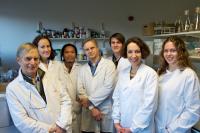Home > Press > Green tea compound shows promise for tackling cancer
 |
| This is the green tea cancer treatment research team (l-r): Dr Laurence Tetley; Professor Gail McConnell; Rumelo Amor; David Blatchford; Greg Norris; Dr Christine Dufès, and Fanny Lemarié.
Credit: University of Strathclyde |
Abstract:
A compound found in green tea could be a weapon in treatments for tackling cancer, according to newly-published research at the University of Strathclyde in Glasgow, Scotland.
Green tea compound shows promise for tackling cancer
Glasgow, UK | Posted on August 22nd, 2012The extract, known as epigallocatechin gallate, has been known to have preventative anti-cancer properties but fails to reach tumours when delivered by conventional intravenous administration.
However, in initial laboratory tests at the Universities of Strathclyde and Glasgow, researchers used an approach which allowed the treatment to be delivered specifically to the tumours after intravenous administration. Nearly two-thirds of the tumours it was delivered to either shrank or disappeared within one month and the treatment displayed no side effects to normal tissues.
The tests are thought to be the first time that this type of treatment has made cancerous tumours shrink or vanish.
In the tests, on two different types of skin cancer, 40% of both types of tumour vanished, while 30% of one and 20% of another shrank. A further 10% of one of the types were stabilised.
The researchers encapsulated the green tea extract in vesicles that also carried transferrin, a plasma protein which transports iron through the blood. Receptors for transferrin are found in large amounts in many cancers.
Dr Christine Dufès, a senior lecturer at the Strathclyde Institute of Pharmacy and Biomedical Sciences, led the research. She said: "These are very encouraging results which we hope could pave the way for new and effective cancer treatments.
"When we used our method, the green tea extract reduced the size of many of the tumours every day, in some cases removing them altogether. By contrast, the extract had no effect at all when it was delivered by other means, as every one of these tumours continued to grow.
"This research could open doors to new treatments for what is still one of the biggest killer diseases in many countries."
The research paper has been published in the journal Nanomedicine. Imaging equipment used in the research was funded by a grant from the Wellcome Trust.
####
About University of Strathclyde
The research links to Advanced Science and Technology, one of the research themes at Strathclyde's Technology and Innovation Centre, a world-class facility uniting academic and industrial partners in seeking innovative research solutions, job creation and business development.
For more information, please click here
Contacts:
Paul Gallagher
44-014-154-82370
Copyright © University of Strathclyde
If you have a comment, please Contact us.Issuers of news releases, not 7th Wave, Inc. or Nanotechnology Now, are solely responsible for the accuracy of the content.
| Related News Press |
News and information
![]() Simulating magnetization in a Heisenberg quantum spin chain April 5th, 2024
Simulating magnetization in a Heisenberg quantum spin chain April 5th, 2024
![]() NRL charters Navy’s quantum inertial navigation path to reduce drift April 5th, 2024
NRL charters Navy’s quantum inertial navigation path to reduce drift April 5th, 2024
![]() Discovery points path to flash-like memory for storing qubits: Rice find could hasten development of nonvolatile quantum memory April 5th, 2024
Discovery points path to flash-like memory for storing qubits: Rice find could hasten development of nonvolatile quantum memory April 5th, 2024
Nanomedicine
![]() New micromaterial releases nanoparticles that selectively destroy cancer cells April 5th, 2024
New micromaterial releases nanoparticles that selectively destroy cancer cells April 5th, 2024
![]() Good as gold - improving infectious disease testing with gold nanoparticles April 5th, 2024
Good as gold - improving infectious disease testing with gold nanoparticles April 5th, 2024
![]() Researchers develop artificial building blocks of life March 8th, 2024
Researchers develop artificial building blocks of life March 8th, 2024
Discoveries
![]() Chemical reactions can scramble quantum information as well as black holes April 5th, 2024
Chemical reactions can scramble quantum information as well as black holes April 5th, 2024
![]() New micromaterial releases nanoparticles that selectively destroy cancer cells April 5th, 2024
New micromaterial releases nanoparticles that selectively destroy cancer cells April 5th, 2024
![]() Utilizing palladium for addressing contact issues of buried oxide thin film transistors April 5th, 2024
Utilizing palladium for addressing contact issues of buried oxide thin film transistors April 5th, 2024
Announcements
![]() NRL charters Navy’s quantum inertial navigation path to reduce drift April 5th, 2024
NRL charters Navy’s quantum inertial navigation path to reduce drift April 5th, 2024
![]() Discovery points path to flash-like memory for storing qubits: Rice find could hasten development of nonvolatile quantum memory April 5th, 2024
Discovery points path to flash-like memory for storing qubits: Rice find could hasten development of nonvolatile quantum memory April 5th, 2024
|
|
||
|
|
||
| The latest news from around the world, FREE | ||
|
|
||
|
|
||
| Premium Products | ||
|
|
||
|
Only the news you want to read!
Learn More |
||
|
|
||
|
Full-service, expert consulting
Learn More |
||
|
|
||








